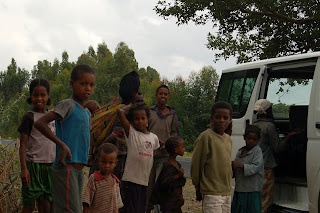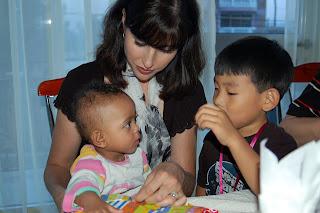I knew I was going to experience an under-developed nation and likely be left wanting for many American niceties. I was not wrong. But I was surprised to discover an extremely industrious people, literally turning tin shanties into internet cafes along the rural roads to Durame. Construction was going on everywhere throughout Addis Ababa. Ethiopia, after years of falling apart under a Communist regime, really seems to be a nation under development.
I was conditioned to expect poverty on a scale I couldn't even imagine. And I was not wrong. The beggars sitting outside the Church gate in Durame only briefly opened for me a window on the vacuous poverty of such places. However, I also discovered a culture so rich in heritage and tradition as to dwarf my own. Ethiopia is the seat of the African Union and the only African nation never to be colonized. Ethiopia is likely the worlds oldest culture, but also home to Emperor Hallie Salise, one of the foundational figures of 20th century politics.
I had learned before traveling that Ethiopia was a majority Orthodox Christian nation, the oldest in the world, but I could never have predicted the ways this would affect the culture - the most popular beer in town is named St. George (not St. Pauli Girl), the airline offered fasting meals (labeled fasting, not vegetarian or vegan), Christian prayers (not Muslim as in much of the Middle East and Africa) were broadcast into the streets starting at 4:30 AM as the priests at the local churches began preparing for their daily services.
A week is never enough to truly get to know a culture, but it is often just enough to fall in love. I am honored to have met such a glorious culture and cannot wait to return.
Here are a couple more picture I snapped of Durame in the morning before we began our journey back to Addis Ababa.
We made a brief but meaningful stop at this medical clinic near Durame. This clinic averages two births a day and is remarkably rough by American standards. However, the young doctor here and his team have had a profound impact on the surrounding community. Holt, the agency through which we arranged our adoption, in keeping with their commitment to keep birth families intact, is currently raising funds to add a surgery center to this clinic. Any money you donate will be money well spent.
A van-full of Americans driving by was apparently reason enough to abandon studies at this school.
Thomas took a moment to explore the Ethiopian countryside.
Thomas snapped this picture of the cows.
Here a couple close-ups of the huts that dotted the landscape between Addis Ababa and Durame.
Children quite literally came out of the woods in the most seemingly remote locations to ask treats of the American tourists.
Yes, they grow corn in Ethiopia. It was just like being back in Iowa.
Thomas took yet another picture of a cow.
I photographed these cows. These are the types of obstacles our driver expertly maneuvered around on our way to and from Durame.
And then, upon our return to Addis Ababa, we finally took custody of baby Ethiopia. Here she is opening a gift Thomas had brought along.
This last picture is particularly precious when you realize Thomas has been calling Lucia his twin and then compare it with this photo taken the first night Russell and Elliot slept with us. He may be onto something.





























































